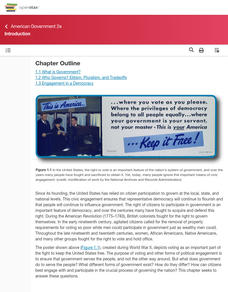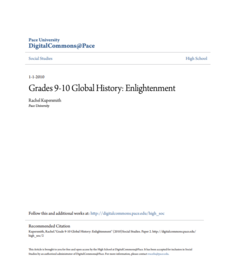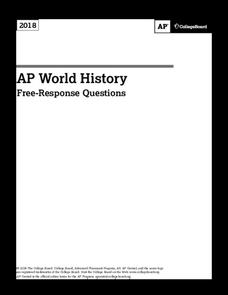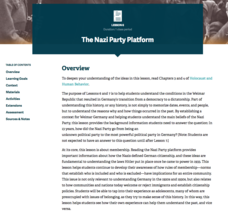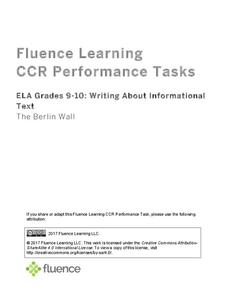Facing History and Ourselves
Why Little Things Are Big
Often our decisions are impacted by a fear of how others see us. That's the big idea in a two-day lesson that asks how false assumptions, how our fear of how others may see us, impact how we act. After watching a video about such a...
US Department of Commerce
Apportionment: Grades 7-8
One person, one voice ... right? Using a simulation where uneven groups are given the same voice, scholars discover why fair apportionment based on an accurate census is important. Once finished, they use actual data to consider what...
Judicial Branch of California
Public Service Announcement: Civic Responsibility
Get your message across. Scholars use their prior knowledge and artistic skills to create public service announcements. The project is designed to explain the importance of civic harmony and the responsibility of all citizens to...
Judicial Branch of California
Defining Civic Duty and Participation
A lesson, geared toward older elementary scholars, combines art with social studies to explain the purpose of civic duty and how to encourage others in the community to participate. Academics create advertising campaigns to promote civic...
Judicial Branch of California
Fayette v. Take Two: The First Amendment
An informative lesson provides scholars the opportunity to study a Supreme Court case regarding the First Amendment and make a ruling with the members of their group. Class members also participate in group discussion and prepare a...
Judicial Branch of California
Where We Fit In: The Judicial Branch
An interesting resource addresses the role of youth in civic participation and community events. It also explains the role of the justice system in creating boundaries and how citizens play a part in the judicial process. Pupils listen...
Rice University
American Government 2e
An informative resource provides a textbook on American government that covers topics such as the definition of government and how democracy works. Each section provides brief questions at the end to assess scholars' understanding.
Pace University
Jacksonian Democracy
Jacksonian Democracy ... a total success or a complete failure? Young academics examine Jacksonian Democracy, including the concept of the supremacy of the federal government and the forced relocation of Native Americans. Scholars...
New York State Education Department
US History and Government Examination: August 2011
Using primary source documents, pupils consider how the United States' democratic story has evolved over time. A second essay question examines the role of geography in history, and multiple-choice questions sharpen test-taking skills.
Pace University
Global History: Enlightenment
The core ideas of the Enlightenment—reason, knowledge, and freedom—represented a rebellion against the despotic control of absolute monarchs. As part of the study of the movement, class members assume the voice or either a monarch or an...
Curriculum Development Institute
Life in the Greek City-States: Athens and Sparta
Developing lessons that address the diversity found in the 21st-century classroom can be a challenge. A plan about life in the Greek city-states of Athens and Sparta provides a model for how instruction can be differentiated to address...
College Board
2018 AP® World History Free-Response Questions
How were the development of railroads critical to the rise of empires? Scholars delve into the relationship between the two using a documents-based question from College Board. Other prompts explore ideas such as nomadic and sedentary...
Facing History and Ourselves
The Nazi Party Platform
Not all party platforms stay democratic. A resource covers many political issues in Germany during the time of World War II, and teaches pupils about the Nazi party platform and what went wrong. Individuals participate in a warm-up...
Judicial Learning Center
Rule of Law WebQuest
Go on a WebQuest to find the Rule of Law! Scholars use the Internet to learn all about how law works in a democracy and how the Rule of Law relates to both American government and governments around the world. Researchers then engage in...
New York State Education Department
US History and Government Examination: June 2016
A comprehension check uses multiple-choice and essay questions for a balanced examination concepts in both US History and government. The test covers a variety of topics, including British mercantilism, the Monroe Doctrine, and the...
Constitutional Rights Foundation
Puritan Massachusetts: Theocracy or Democracy?
Was Puritan society governed as more of a theocracy or democracy? After comparing and contrasting a series of primary source documents, middle and high schoolers form small groups and debate the question.
Facing History and Ourselves
Laws and the National Community
When it comes to the law, is justice always served? Teach scholars about how law sometimes enables prejudice of entire groups of people with a unit on World War II that includes a warm-up activity, analysis of primary sources,...
Facing History and Ourselves
The Weimar Republic: Historical Context and Decision Making
Did you know that way before Hitler became a dictator, he actually spent nine months in a German jail? Provide the background for the escalating point before the Nazi party took over in World War II through the exercises in the resource....
Carolina K-12
Making First Vote Your Vote: Designing a Schoolwide Election
Encourage pupils to design an election plan for the entire school. They participate in a Board of Elections, create polling rules, discuss election controversies, write questions about the issues, run the election through an online...
US Institute of Peace
Governance, Corruption and Conflict Simulation on Nepal
Can your class help the people of Nepal? Scholars take an in-depth look into the social injustices and struggling economy of a country in turmoil during a multi-day role-playing exercise. After reviewing information on the problems...
Fluence Learning
Writing About Informational Text The Berlin Wall
On June 26, 1963 President John F. Kennedy delivered his famous "Ich bin ein Berliner" speech close to the Berlin Wall at the Rudolph Wilde Platz. On June 12, 1987 President Ronald Reagan Delivered his famous "Mr. Gorbachev, tear down...
National Constitution Center
Creating Your Own Town Hall Poster
Middle and high schoolers are walking into a world rife with strong political viewpoints and vocal opinions. Help to prepare them for controversial discussions with a lesson in which they choose, research, and learn more about a...
Indiana Department of Education
Voting: It's Not a Spectator Sport!
Why is it important to vote? Who is eligible to vote? Why is it that some eligible voters do not vote? Class members conduct interviews with adults and other school mates before researching the eligibility requirements for their state,...
Museum of Tolerance
The Pursuit of Democracy and Diversity: The Trial of Pro-Social Injustice in Historical Documents and Accounts
Class members investigate The Indian Removal Act of 1830, U.S. Theft of Mexican Territory Timeline, and President Abraham Lincoln’s letter to Horace Greeley, 1862, and then conduct a mock trial of each of these documents to determine...








